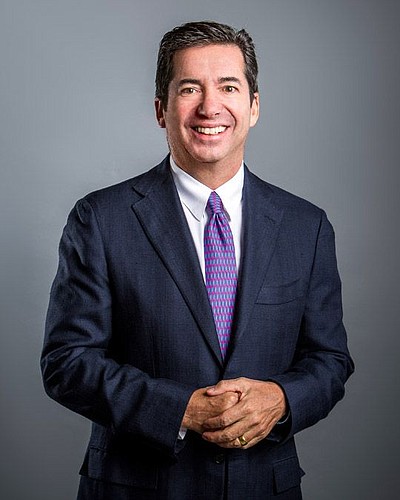
When it comes to treating cancer, Jacksonville is a unique place — and that’s not hyperbole.
Jacksonville is the only city in the U.S. with two facilities using proton therapy to treat cancer, a feature that not only brings medical but also economic benefits to the community, the leaders of the two facilities said Friday.
“Jacksonville is a dynamic health-care community,” said Scot Ackerman, medical director of the Ackerman Cancer Center, during a lunch meeting of the Economic Roundtable of Jacksonville.
The Ackerman center began offering proton therapy last year at its Mandarin location, while the UF Health Proton Therapy Institute just celebrated its 10th anniversary at its facility on Eighth Street near Downtown.
Proton therapy is a treatment that destroys cancer cells by using proton particles to deliver targeted doses of radiation.
Ackerman said it is preferable to other forms of radiation treatment because proton therapy has less impact on surrounding tissue and has fewer side effects.
There are only 25 proton therapy centers operating in the U.S., with 11 in development, but Ackerman expects to see the treatment grow.
“I’m very bullish on proton therapy and there is high demand for proton therapy as we move into the future,” he said.
Ackerman treats mostly local patients but the much larger UF Health center has treated patients from 30 countries, said Executive Director Stuart Klein.
“People from all over the world have come to our facility for treatment,” he said.
UF Health has treated 6,700 people over the last decade. It ranks fourth in the world in the number of overall proton therapy patients and first in pediatric patients, Klein said.
“We treat more kids in our facility than any facility in the world,” he said.
About half of its current patients are from outside the Jacksonville area. But for its history, the percentage has been about 70 percent, Klein said, bringing a tangible economic impact.
The course of treatment takes six to eight weeks, and patients traveling from outside may end up spending two to three months in Jacksonville along with family members.
UF Health has determined the average outside patient spends $5,500 in the community during his or her treatment, Klein said.
Since UF Health is a teaching hospital, the proton therapy center also brings in groups for educational purposes.
“For instance, we have group coming from China in two weeks,” Klein said.
UF Health’s 98,000-square-foot facility initially was built with a $125 million investment, and the institute this year announced a three-year, $39 million expansion project, he said.
Ackerman said it’s not just proton therapy that makes Jacksonville a cutting-edge medical community. He pointed to other health services offered by UF Health and places like the Mayo Clinic.
“Jacksonville is a destination medical city,” he said. “The economic impact of that has a ripple effect.”
Ackerman said the various medical facilities attract biotech research companies to the area.
“It’s a good place to do trials of these medical devices,” he said.
Klein and Ackerman said there are issues with insurance companies approving proton therapy, since it is a relatively new procedure. But Ackerman said the science behind the treatment is proven and he expects it to become more acceptable.
“This is a wonderful way to treat patients,” he said. “Proton therapy is a game-changer.”